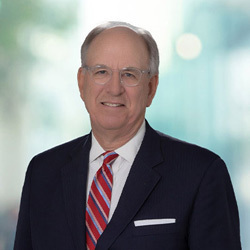HeplerBroom’s Indiana office recently secured the dismissal of a long-standing lawsuit against its client, a product defendant in an asbestos case, on the basis that the Court lacked personal jurisdiction over the client. Notably, HeplerBroom was able to overcome the plaintiff’s various tactics for attempting to prove jurisdiction over the client, including an attempt to establish jurisdiction by piercing the corporate veil. This result was significant as it likely will bar any future attempts to name the client as a defendant in future asbestos litigation in Indiana ...

Under Illinois law, a healthcare provider facing allegations of malpractice knows that the standard by which his or her actions will be judged is what a reasonably careful healthcare provider would do under the same or similar circumstances based upon testimony provided by expert witnesses from the same area of practice. However, physicians and healthcare providers practicing in prisons, jails, and detention facilities will find that their decisions will be adjudicated under disparate standards that depend on a lay jury’s understanding of “objective ...
While overall trends show that more and more litigants are appearing in court without an attorney, in the medical malpractice context, defending a case against a pro se plaintiff is not as common. This is particularly true in courts where the amount in controversy must be in the tens of thousands before a court can even hear the case (e.g., in the Circuit Court of Cook County, Illinois, where the Law Division only hears civil suits for recovery of monetary damages in excess of $30,000). Nonetheless, we have all had one. You probably still have one now – and every pro se case brings its own ...

On January 31, the Federal Trade Commission (FTC) published its annual adjustments to the reporting thresholds under the Hart-Scott-Rodino Antitrust Improvements Act of 1976, as amended (HSR Act). The newly-revised thresholds represent modest increases over last year’s thresholds. They are published in the Federal Register and will become effective 30 days after the date of their publication. The revised thresholds will remain in effect until the FTC’s next annual adjustment in the first quarter of 2021.
HSR Act Basics
The HSR Act requires parties to mergers ...
In 2019, 72,675 Charges were filed with the Equal Employment Opportunity Commission (EEOC). Frequently, EEOC Charges are filed regardless of whether the claim has any merit. Since the EEOC has the authority to investigate regardless of whether there is reasonable cause to believe discrimination occurred, any EEOC Charge is going to cost an employer time, effort, and money to deal with it.
During the EEOC’s investigation, the employer and the Charging Party will be asked to provide information related to the Charge. The EEOC may ask an employer to: 1) submit a statement of position ...
The laws governing the Cannabis industry are changing so rapidly that it's almost impossible to keep up with all the new legislation across the country. Currently, there are over 1,100 cannabis bills in state legislatures and Congress for 2020. While most in the industry do not believe we will see national legalization in 2020, an additional seven states could legalize cannabis in some form this year. That would bring the 2020 total to 40 states with some form of legalized cannabis. Presidential candidate Bernie Sanders announced at an Iowa rally that if he is elected to the White House ...
This post updates the October 15, 2019, blog post regarding the citizen enforcement proceeding against Midwest Generation, LLC (“MWG”) launched by several environmental advocacy groups (“Environmental Groups”). (That post can be read here.)
On February 6, 2020, the Illinois Pollution Control Board (“Board”) issued an order in Sierra Club, et al. v. Midwest Generation, LLC (PCB13-15) (“Reconsideration Order”) reconsidering its June 20, 2019, interim opinion and order (“Interim Order”). As addressed in greater detail in the earlier post, MWG owns four ...
If you have not looked at your debt collection policies or read your form “dunning letter” in a while, you might need to add some routine check-ups to your 2020 calendar. While collection jurisprudence rarely undergoes a large overhaul, it should be no surprise that tightening protections for consumers are already on the horizon. Consumer protection issues are frequent headliners in national news. From nationwide data breaches to ever increasing household debt, and now with student loan borrowing and medical debt emerging as hot topics in the 2020 presidential election, I ...

Facebook boasts of connecting us, of connecting users from across the world and uniting them by common interests and friendships. One of the features for connecting users is the tagging feature – a way to indicate who is appearing in a photograph. Facebook users can tag themselves and also tag their friends. Facebook can also participate, using facial-recognition software to suggest the names of the people appearing in a users’ photos. See Patel v. Facebook, Inc., 932 F.3d 1264, 1268 (9th Cir. 2019) (“If Tag Suggestions is enabled, Facebook may use facial-recognition ...

Fresh off major wins in the 2019 session, Missouri tort reform advocates are shifting their focus to a new target: punitive damages. Following a string of large punitive damages awards from St. Louis City courts, legislators in both chambers introduced bills to sharply curb such claims.
Senate Bill 591, introduced by Senator Bill White (R-Joplin), would establish new substantive and procedural restrictions on punitive damages claims. Most critically, the bill would raise the burden of proof on plaintiffs seeking punitive damages awards. Under existing Missouri law, a plaintiff ...

